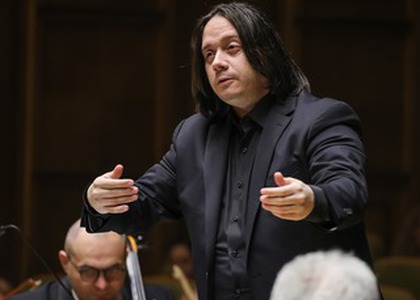>

Interview with conductor Gabriel Bebeșelea
Gabriel Bebeșelea will conduct the opening concert of the Radio National Orchestra's season on Friday, October 10th. Together with the Radio Academic Choir, prepared by conductor Ciprian Țuțu, and the young pianist Eva Garet, the ensemble will present an all-Ravel program, paying tribute to the composer's artistic legacy on the 150th anniversary of his birth.
Mr. Gabriel Bebeșelea, you return to the stage of the Radio Hall alongside the Radio National Orchestra for a special concert celebrating both Ravel's 150th anniversary and the 85th anniversary of the Radio Academic Choir. How would you describe the ensemble's identity today and your relationship with it?
I would start with my long and close collaboration with both the Radio National Orchestra and the Radio Academic Choir. Since my very first concert in 2013, I have worked with both ensembles, and from the very beginning we connected extremely well-musically and personally. This bond has made it a real pleasure to return to the podium of the Radio National Orchestra and to collaborate again with the Radio Academic Choir.
As for the choir, it is an ensemble of remarkable quality, particularly from a stylistic point of view. I have always admired its flexibility and, above all, the wide range of tonal colors it can achieve, allowing it to interpret very different repertoires with stylistic accuracy and expressive depth.
What impression did your previous collaboration with pianist Eva Garet leave on you, and what do you consider to be her main qualities?
She is a genuine talent-something you can sense within the first few seconds of hearing her play. She has an exceptional sense of timing, which struck me immediately, even before I learned how young she was. This sense of timing gives her performances a remarkable coherence and maturity, something very rare. Most of all, I'm impressed by the natural ease with which she approaches even the most demanding works.
How would you describe Ravel's musical world, and what aspects of his artistic personality are reflected in the works you will perform on Friday, October 10th?
For the opening concert of the Radio National Orchestra's season, I wanted to present a wide spectrum of Ravel's stylistic universe-from works that have a strong impact on audiences, such as his famous Bolero, to pieces written for ballet, like Daphnis et Chloé, which we'll perform together with the Radio Academic Choir.
The Piano Concerto in G major is a particularly special work in the concerto repertoire-not only for its pianistic brilliance but also for its vibrant colors and rhythmic energy, two defining traits of Ravel's style.
The program concludes with one of the most challenging pieces ever written, in my opinion-La Valse. It evokes 19th-century Vienna, yet through its color and orchestration, it also reflects a distinctly Parisian sensibility. It's an extremely demanding composition because it brings together everything Ravel had written up to that point, as well as the essence of what was to come. You can recognize all his stylistic fingerprints here: the rubato nuances, the harmonies, the orchestral colors-all integrated with exceptional finesse. For me, La Valse remains one of the most difficult and fascinating works ever composed.
Translated by Darius Baciu,
University of Bucharest, Faculty of Foreign Languages and Literatures, MTTLC, year II
Corrected by Silvia Petrescu














